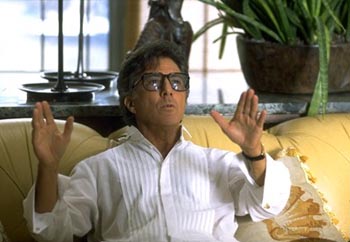
Spin Producer: Dustin Hoffman plays a Hollywood mogul caught up in a political campaign in 'Wag the Dog.'
The public gets led astray in 'Wag the Dog'
MOST OF THE ACTION in the political comedy Wag the Dog seems to be visible out of the corner of the eye. This guide on how to strum the national heart strings is outlined by a handful of actors and simple props. Among the best jokes in Barry Levinson's needle-sharp film about media manipulation is that the masters of the nation are weary people. They're business travelers who have spent too many nights on the road; they plot out a major conspiracy miserably squeezed up on couches, sleeping in their clothes. A boring presidential election is underway. The incumbent's popular slogan is "Don't Change Horses in the Middle of the Stream." Days before the election, the president is accused of groping a Firefly Girl. The eminent spin-doctor Conrad Brean (Robert De Niro) is called on to plan a containment strategy.
A war is the only thing that can distract the press from the sex scandal. Picking the "shifty, standoffish" country of Albania as the source of the belligerence, Brean and the president's liaison, Winifred Ames (Anne Heche), fly off to Hollywood to meet Stanley Motss (Dustin Hoffman), the noted Hollywood producer who would know better than anyone how to fake some war footage. Before Wag the Dog is over, the war has escalated into a hostage crisis and a nation grieves for "Good Old Shoe," William Schumann, a soldier left behind the lines. The molested Firefly girl is safely forgotten until after the election.
Mark Knopfler's simple, catchy acoustic-guitar soundtrack matches the mood of music on the cusp of the '60s and early '70s. The '70s movie is also reflected in the bleak photography, the outstanding actors playing smaller-than-life roles and the low budget. The story is told with a hand-held camera, zooms and few exteriors. The staccato imagery harmonizes with David Mamet and Hilary Henkin's clipped, percussive dialogue. Cameos include Craig T. Nelson as the opposing candidate for president--not necessarily the better man. SCTV's Andrea Martin has only a few scenes (damn it) as a Hollywood consultant. Willie Nelson plays the beleaguered official songwriter of the Albanian war who comes up with "We Are the World" hymns and a blues song (with "Pop" Staples) for Good Old Schuman. Woody Harrelson has a surprise part as the monster all of these political Frankensteins create. Hoffman is rich as Motss, master of his world but just a guppy in Conrad and Winifred's shark tank.
Levinson's elliptical approach keeps the mass of America and the mass media out of view. They're glimpsed fleetingly during TV broadcasts. Conrad and his spin doctors are so confident of their results that they don't even seem in suspense about how the game will go. Levinson's refusal to exult in the spectacle of the manipulated crowds who take the bait and swallow it keeps the comedy from turning patronizing. This serious streak is the advantage a mainstream director like Levinson has when making an avant-garde political satire.
Wag the Dog is especially fresh coming as it does so soon after the orchestrated mourning for Princess Di. Maybe it's just a coarse taste in comedy in my part, but central passages in Wag the Dog seemed to lag, giving that undesirable state of watching and thinking "My, this certainly is funny" instead of laughing out loud. Even these down times are excusable; perhaps Wag the Dog isn't a comedy but a sad, angry story comically told. This film says what the alternative media have been trying to say for years--only Wag the Dog says it all (sigh) much more amusingly.
Wag the Dog (R; 105 min.), directed by Barry Levinson, written by David Mamet and Hilary Henkin, based on the book by Larry Beinhart, photographed by Robert Richardson and starring Robert De Niro and Dustin Hoffman.
[ San Jose | Metroactive Central | Archives ]
![[Metroactive Movies]](/movies/gifs/movies468.gif)